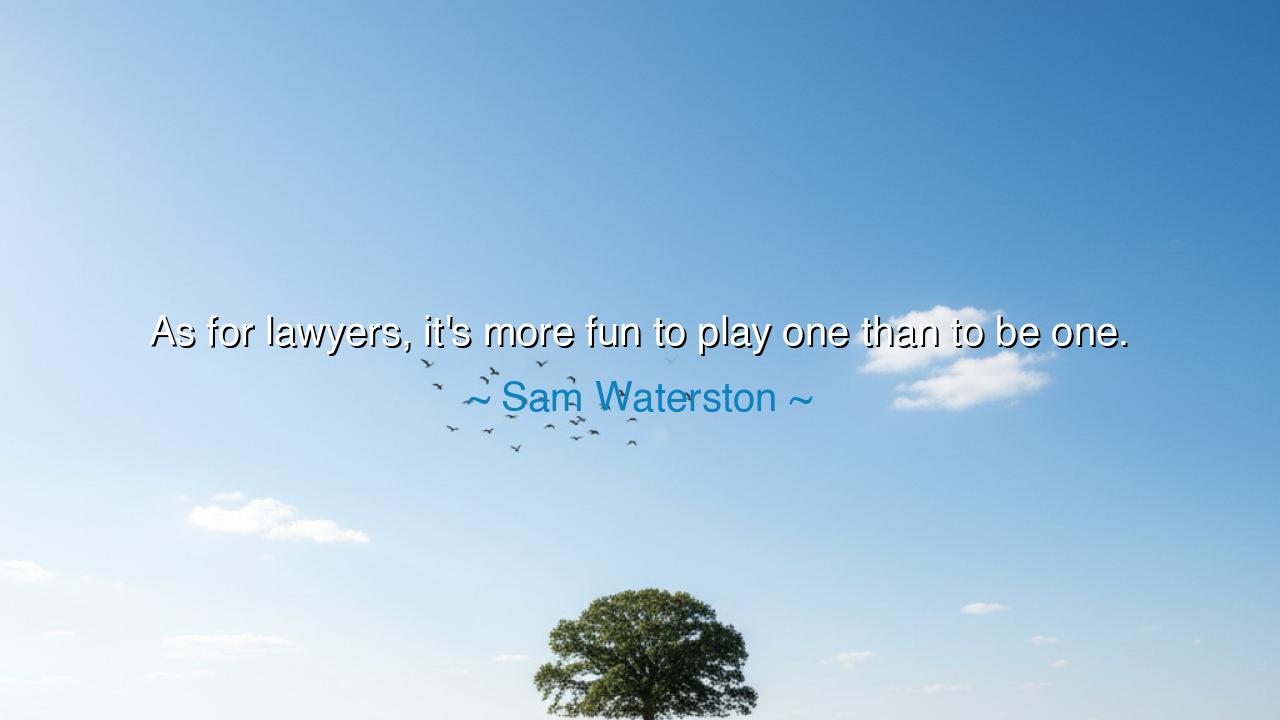
As for lawyers, it's more fun to play one than to be one.






Hear, O listener, the words of Sam Waterston, the actor whose face became known through the dramas of the courtroom on stage and screen: “As for lawyers, it’s more fun to play one than to be one.” At first these words seem spoken in jest, light as a feather. Yet beneath the laughter lies a deep truth about appearances and realities, about the difference between art that imitates and life that endures. For Waterston knew the stage and the script, but he also understood the burden that true lawyers carry in the world beyond fiction.
The meaning of this saying is found in contrast. To play a lawyer is to step into a world shaped by writers, where the speeches are elegant, the battles sharp, and the triumphs clear. The actor is free to embody the drama without bearing its weight. But to be a lawyer is to live within the endless complexities of reality, where cases drag on, victories are partial, and defeats cut deeply into the lives of real people. The actor leaves the role behind when the curtain falls; the true lawyer carries the burden always, through day and night, through triumph and grief.
Consider the life of Clarence Darrow, one of America’s most famous attorneys. In the plays and films about him, he is remembered for his soaring oratory in the Scopes Trial, defending the teaching of evolution against the forces of tradition. His words are quoted like poetry, his presence immortalized. Yet the real Darrow spent long nights in preparation, endured the weariness of constant battle, and bore the heavy weight of lives placed in his hands. To play him on stage is exhilarating; to be him in truth was costly and exhausting.
So too in the history of ancient Rome, the orators of the forum dazzled crowds with their arguments. Cicero himself, remembered for his eloquence, lives in the memory of history as a master of words. But in reality, his life was filled with danger, enemies, and betrayals. His victories in court were not only matters of performance but matters of life and death, for one misstep meant exile, disgrace, or the sword. The contrast remains: it is more enjoyable to imitate the struggle than to endure it.
Mark this well, O seeker: Waterston’s words remind us of the difference between appearance and reality, between the ease of performance and the cost of practice. The actor entertains, but the lawyer bears responsibility. One plays with truth in symbols and stories; the other must guard truth in the face of corruption, deceit, and despair. It is no small thing to stand in defense of justice when the stakes are freedom, livelihood, or life itself.
Let this be the lesson: do not be deceived by the glamour of what is shown. The surface is often bright while the depths are stormy. Respect those whose work is not the stuff of entertainment but the substance of reality. Honor the doctors, the teachers, the lawyers, the laborers, whose lives are filled not with applause but with duty, sacrifice, and endurance. Their toil is less fun to imagine but far greater in worth to the world.
Therefore, O child of tomorrow, take Sam Waterston’s jest as wisdom. Enjoy the stories, yes—delight in the dramas of courtrooms on stage and screen. But do not mistake the stage for the world itself. And when you meet those who live the reality, treat them with reverence, for their battles are harder, their victories rarer, and their burdens heavier than art can show.
Thus, the actor’s quip becomes a timeless truth: to play a lawyer is fun, but to be one is sacrifice. And through this truth we are reminded to look past the glitter of performance to the gravity of life, and to give thanks for those who fight in the real courts where justice is truly won or lost.






AAdministratorAdministrator
Welcome, honored guests. Please leave a comment, we will respond soon